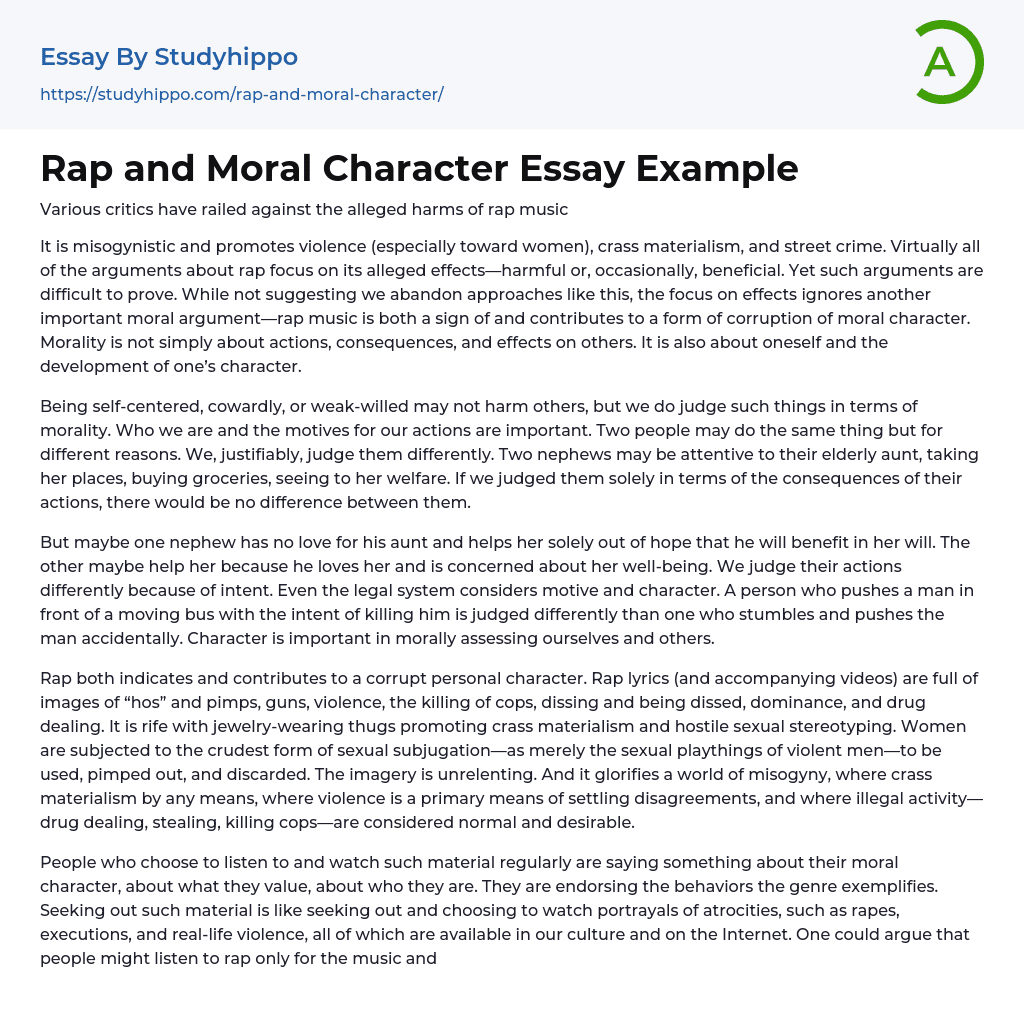Various critics have railed against the alleged harms of rap music
It is misogynistic and promotes violence (especially toward women), crass materialism, and street crime. Virtually all of the arguments about rap focus on its alleged effects—harmful or, occasionally, beneficial. Yet such arguments are difficult to prove. While not suggesting we abandon approaches like this, the focus on effects ignores another important moral argument—rap music is both a sign of and contributes to a form of corruption of moral character. Morality is not simply about actions, consequences, and effects on others. It is also about oneself and the development of one’s character.
Being self-centered, cowardly, or weak-willed may not harm others, but we do judge such things in terms of morality. Who we are and the motives for our actions are impor
...tant. Two people may do the same thing but for different reasons. We, justifiably, judge them differently. Two nephews may be attentive to their elderly aunt, taking her places, buying groceries, seeing to her welfare. If we judged them solely in terms of the consequences of their actions, there would be no difference between them.
But maybe one nephew has no love for his aunt and helps her solely out of hope that he will benefit in her will. The other maybe help her because he loves her and is concerned about her well-being. We judge their actions differently because of intent. Even the legal system considers motive and character. A person who pushes a man in front of a moving bus with the intent of killing him is judged differently than one who stumbles and pushes the man accidentally. Character is important in morally assessing ourselves
and others.
Rap both indicates and contributes to a corrupt personal character. Rap lyrics (and accompanying videos) are full of images of “hos” and pimps, guns, violence, the killing of cops, dissing and being dissed, dominance, and drug dealing. It is rife with jewelry-wearing thugs promoting crass materialism and hostile sexual stereotyping. Women are subjected to the crudest form of sexual subjugation—as merely the sexual playthings of violent men—to be used, pimped out, and discarded. The imagery is unrelenting. And it glorifies a world of misogyny, where crass materialism by any means, where violence is a primary means of settling disagreements, and where illegal activity—drug dealing, stealing, killing cops—are considered normal and desirable.
People who choose to listen to and watch such material regularly are saying something about their moral character, about what they value, about who they are. They are endorsing the behaviors the genre exemplifies. Seeking out such material is like seeking out and choosing to watch portrayals of atrocities, such as rapes, executions, and real-life violence, all of which are available in our culture and on the Internet. One could argue that people might listen to rap only for the music and not pay attention to the lyrics.
In response, consider the following parallel. Imagine that a genre of music emerged that had interesting music but whose lyrics and accompanying videos were entirely devoted to the denigration of a particular race and the superiority of another. I doubt that we would believe that self-described nonracist people listened only for the artistry of the music and ignored the lyrics. But even if this was the case, we would likely still find a moral failing in that.
Their failure to see and condemn the message of the lyrics would itself be a moral failing. Finally, even if some individuals failed to recognize the message of the lyrics, that cannot be true of everyone who listens to the material.
If it was simply the music and not the important lyrics, other lyrics would develop. This singular vision would not be as pervasive in the genre. Other genres are not as unrelenting and uniform in their vision of the world. The state cannot prevent us from corrupting our character, nor should it. However, that does not prevent me, as an individual, from deploring the corruption of character in rap. We make a decision when we choose to listen to music.
The choice to persistently listen to a form of music that celebrates thugs, violence, drug dealing, Crass materialism, and the denigration of women shows a Corruption of character and deserves moral censure.
- Media Violence essays
- Domestic Violence essays
- Violence in Video Games essays
- Gun Violence essays
- Video Game Violence essays
- Violence Against Women essays
- Youth Violence essays
- Belief essays
- Deontology essays
- Ethical dilemma essays
- Moral essays
- Normative Ethics essays
- Values of Life essays
- Virtue essays
- Virtue Ethics essays
- Work Ethic essays
- Abortion essays
- Abuse essays
- Animal Rights essays
- Animal Testing essays
- Assault essays
- Bullying essays
- Controversial Issue essays
- Crash essays
- Cyber Bullying essays
- Feminism essays
- Human Rights essays
- Immigration essays
- Inequality essays
- Poverty essays
- Prejudice essays
- Racism essays
- Torture essays
- Violence essays




